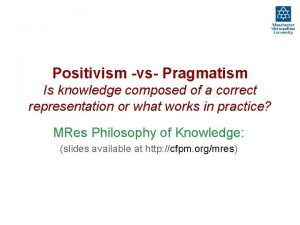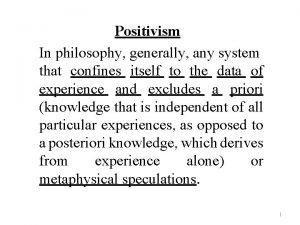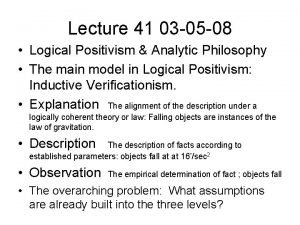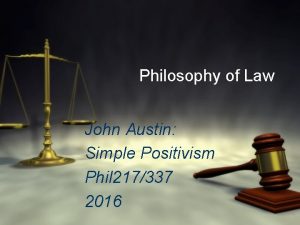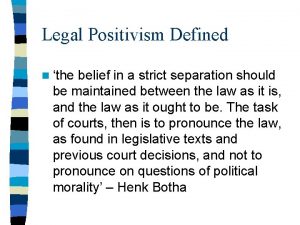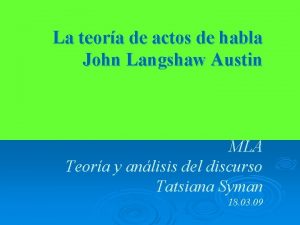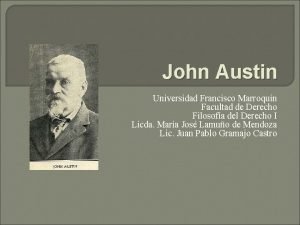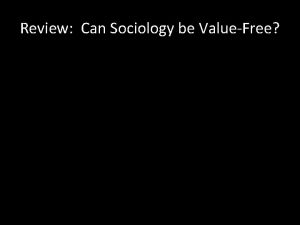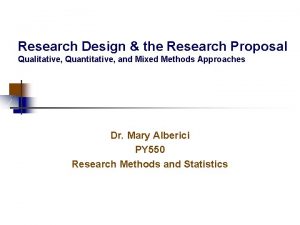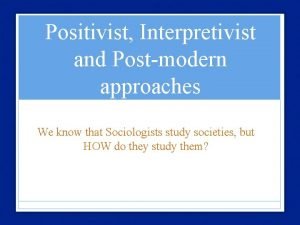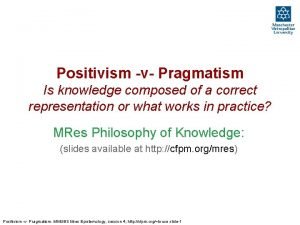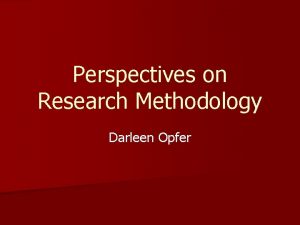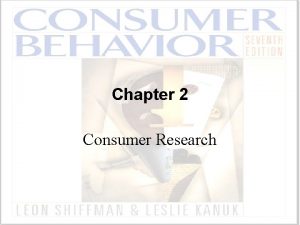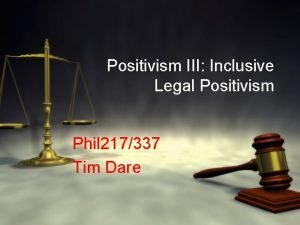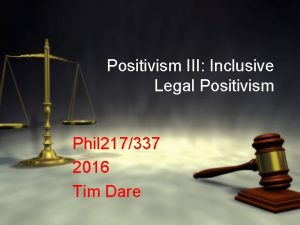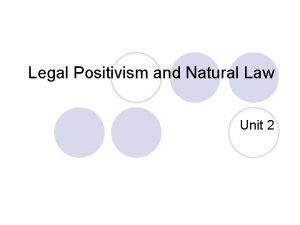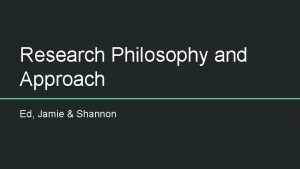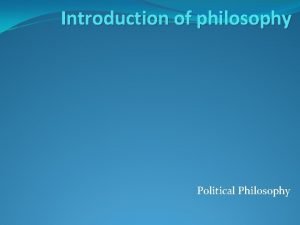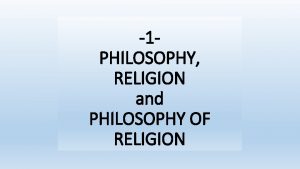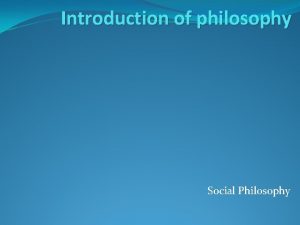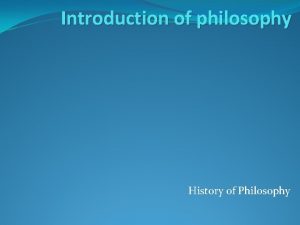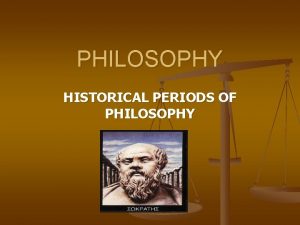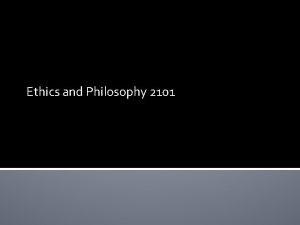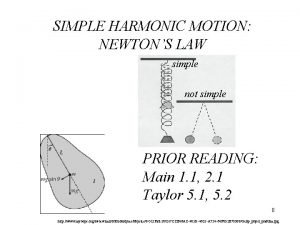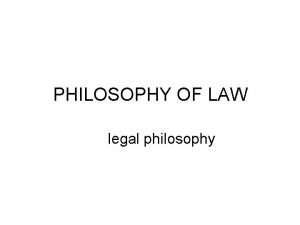Philosophy of Law John Austin Simple Positivism Phil


























- Slides: 26

Philosophy of Law John Austin: Simple Positivism Phil 217/337 2016

John Austin (1790 -1859) The existence of law is one thing; its merit or demerit is another. Whether it be or be not is one enquiry; whether it be or be not conformable to an assumed standard, is a different enquiry. A law, which actually exists, is a law, though we happen to dislike it, or though it vary from the text, by which we regulate our approbation disapprobation. The Province of Jurisprudence Determined, Lecture V or

Reacting to … • Blackstone and natural law: The idea that there simply could not be valid human laws which were inconsistent with the law of nature. “ As to the several sorts of servants: I have formerly observed that pure and proper slavery does not, nay cannot, subsist in England. . . And indeed it is repugnant to reason, and the principles of natural law, that such a state should subsist any where. Upon these principles the law of England abhors, and will not endure the existence of, slavery within this nation: …”

Influenced by … • The Scientific Revolution • British Empiricism • Prior to the Scientific Revolution of the 1600's moral, legal, social and political philosophy (and practice) had been `Aristotelian'. Widely accepted that: we could not apply the standards and methods of scientific inquiry to reasoning about practical matters. “But this must be agreed upon before hand, that the whole account of matters of conduct must be given in outline and not precisely, as we said at the beginning the accounts we demand must be in accordance with the subject matter: matters concerned with conduct and questions of what is good for us have no fixity”. Aristotle’s Nicomachean Ethics 1104 a 1 -4

“The present work as well as any other work of mine … is an attempt to extend the experimental method of reasoning from the physical branch to the moral. ” w Jeremy Bentham

Implications for Austin: • Within Austin's approach, whether something is or is not law depends on observable empirical criteria. It is a question of empirical observation rather than morality. • Bases the determination of legal validity on social facts • Look at his taxonomy of law with this in mind …

The Province of Jurisprudence Law Descriptive: eg Laws of science - improperly called law Prescriptive Divine Law Human Laws not directed from political superior to political inferior: eg. laws of cricket Rules enforced by Mere opinion (eg. etiquette) are analogous to these ‘laws’ but improperly called law Laws which express a wish coupled with a threat Laws directed from political superior to political inferior Laws which do not express a wish coupled with a threat

Austin’s Command Theory of Law Imperatives Requests Pleas Features • Habit of obedience • Determinate and common superior Not positive laws: orders to valet etc Warnings Commands Of Sovereign Not of Sovereign: Parents, God, etc Positive laws Features: • From political superior to inferior • Might/Power • Threat • Sanction • Duty Features: • To whole community • To perform certain kinds of acts

Note … • Austin thinks all of the distinctions he makes can be drawn on empirical or factual grounds: • The sovereign doesn’t rule by dint of any moral right to rule: he or she is just the person who is in fact habitually obeyed etc. • He aims to provide a complete account of law that does not include evaluations, e. g. that this law is good, or defective.

Austin on ‘duty’ E. g. Where we nowadays think of ‘duty’ as a moral or normative notion, Austin thinks it is simply a matter of being subject to a certain sort of command … “Being liable to evil from you if I comply not with a wish which you signify, I am bound or obliged by your command, or I lie under a duty to obey it”.

Commands, Sanctions, and Duty • Why might Austin think there is a conceptual connection between commands, sanctions, and duty

Law and Practical Reasoning “Our understanding of law is defective unless it includes and is based upon a sound understanding of the role of law in practical reasoning. The first precept of legal theory is that law is practical, that its essential function is to play a role in its subjects reasoning about what to do”. Joseph Raz ‘Facing Up’ (1989) Southern California Law Review

Simple Positivism’s Account • Austin’s homogeneous model of reasons for action: • Reasons for action work by ‘weight’. The right or rational thing to do is that thing which we have the weightiest reasons to do. • Laws are conceptually of a kind with all other reasons for action. Given that, they compete on practical deliberation with other reasons. If ‘following the law’ is the right thing to do it is because laws win the ‘balance of reasons.

Hart’s critique of Austin • This is one of the great take-downs in jurisprudence. (Hart’s take-down of the realists is good, too. ) • Rhetorically the strategy is to show that Austin’s theory is completely inadequate without a lot of amendments, which would render it unrecognizable as Austin’s theory. • The setup is to contrast the gunman demanding “hand over the money or I’ll shoot” with something we’d all agree is a law. Is Austin’s theory more like the gunman case, or does he succeed in defining law?

gunman + ? ? ? = Law • What do we have to add to the gunman case before we have an intuitive sense that we have law? Hart answers … w Generality, in terms of classes of persons and classes of acts. (Austin says this. ) w Persistence. w General obedience. w Supremacy (Austin says this) and independence (he misses this). w Law binding on the law-maker (p. 42). w Meaning apart from intent of law-maker.

gunman + ? ? ? = Law • But there’s something deeper – what’s wrong with law as coercive force? • Doesn’t account for a sense of obligation, as opposed to complying out of fear, or at least prudence. • Laws must “constitute standards by which particular actions may be … critically appraised” (Hart, p. 32).

Being Obliged vs Obligation cont. , • Compare ‘being obliged’ to hand your wallet to the armed robber and ‘having’ an obligation to do so. • The criticism is often summed up by complaining that Austin makes the law sound like a gunman, who gives people purely prudential reasons for action. (See homogenous account above).

Problems: “Obligation” “Being liable to evil from you if I comply not with a wish which you signify, I am bound or obliged by your command, or I lie under a duty to obey it”. Here Austin implies: w that ‘being obliged’ and ‘having a duty’ are equivalent. w That both are to understood as ‘prudentially’: that to have a duty is to be subject to a certain balance of reasons

But … • Critics have argued that whereas : (1) Being obliged: - involves motives and beliefs, in terms of harm or unpleasant consequences. (2) Having an obligation: - is "very different" and cannot be understood purely prudentially.

General problem of normativity: DINO • Where does normativity come from, on Austin’s account? • Remember the chicken-and-egg argument. One response would be that the power to create a norm isn’t conferred by a norm, but by habits of obedience. • “Superiority signifies might. ” He’s not saying the sovereign ought to be obeyed, only that the sovereign can hang you if you don’t. • But then you can only get descriptive conclusions out of Austin’s theory.

Varieties of Law • Austin’s theory might work for criminal prohibitions, but can you represent the following within the Austinian framework? w A statute granting an administrative agency the right to approve applications for a broadcast license. w The NZ Company Law (or whatever it’s called) setting out default rules for the organization of corporations, which in most cases can be modified. w Rules of jurisdiction (Hart, p. 29), evidence, and procedure. w Statutes regulating divorce and child-custody proceedings, or empowering people to make wills. w Statute specifying qualifications for becoming a judge.

Varieties of Law • Hart’s point is that a command-sanction account lacks the conceptual resources for dealing with perfectly ordinary laws. • Hart calls them “power-conferring rules” and they are a significant component of most legal systems. • Austin can reply that these laws do impose a threat – namely, invalidity – if they are not complied with. You can’t really incorporate a business unless you file the right paperwork with the Companies’ Office.

nullity as a sanction? • Doesn’t account for power-conferring rules. • On Austin’s theory, one can distinguish between: w The conduct sought to be prohibited, and w The sanction to be imposed if the subject disobeys. • Argument #1: With power-conferring rules, however, there really is no conduct apart from the law. A corporation makes sense only as a legal idea. • Argument #2: For some laws, you can subtract the sanction and still have an intelligible standard of behavior, but that doesn’t make sense of wills, contracts, jurisdictional rules, etc. (p. 34).

Kelsen’s attempted solution • Why not conceive of laws not as directives to citizens, but to officials? • Rules respecting the formation of rules are recast conditional sanctioning directives: w “If a will has been validly made and the executor refuses to transfer title to the beneficiaries, then the court shall impose sanctions on the executor” (p. 36). • But law functions as a means of social control. Citizens believe themselves to be empowered by statutes to create legal rights and duties. • Law is not only about what happens in courts (p. 39). People orient themselves self-consciously toward the law – Hart’s “puzzled man. ”

Hart’s overarching critique • Consider the baseball/cricket analogy: Players use the rules in guiding purposive activities. • In other words, Austin can’t account for the normativity of law. • Law is supposed to have the capacity to change others’ reasons for action. Prudence (fear of being shot by the gunman) is a preexisting reason; law does not add anything to the subject’s reasons. • Also, lawmakers believe themselves to rule by right, not merely by de facto power.

can hart escape his own trap? • These are powerful arguments. For next time let’s see if Hart can account for the normativity of law, on a social-facts model, without committing the DINO fallacy.
 What is positivism in philosophy
What is positivism in philosophy Positivism
Positivism What is positivism in philosophy
What is positivism in philosophy What is logical positivism in philosophy
What is logical positivism in philosophy Austin philosophy
Austin philosophy Legal positivism definition
Legal positivism definition Langshaw
Langshaw John langshaw austin
John langshaw austin Positivisme
Positivisme जॉन ऑस्टिन
जॉन ऑस्टिन Newton's first law and second law and third law
Newton's first law and second law and third law Newton's first law
Newton's first law Boyles law
Boyles law Avogadro's law constants
Avogadro's law constants Is sociology a science
Is sociology a science Positivism sociology
Positivism sociology Positivism methodology
Positivism methodology Appendix sample
Appendix sample Interpretivist
Interpretivist Positivism vs rationalism
Positivism vs rationalism Positivism methodology
Positivism methodology Positivism methodology
Positivism methodology Logisk positivism
Logisk positivism Neoclassicism criminology
Neoclassicism criminology Consumer research paradigms
Consumer research paradigms Biological positivism
Biological positivism Positivism behaviorism
Positivism behaviorism

